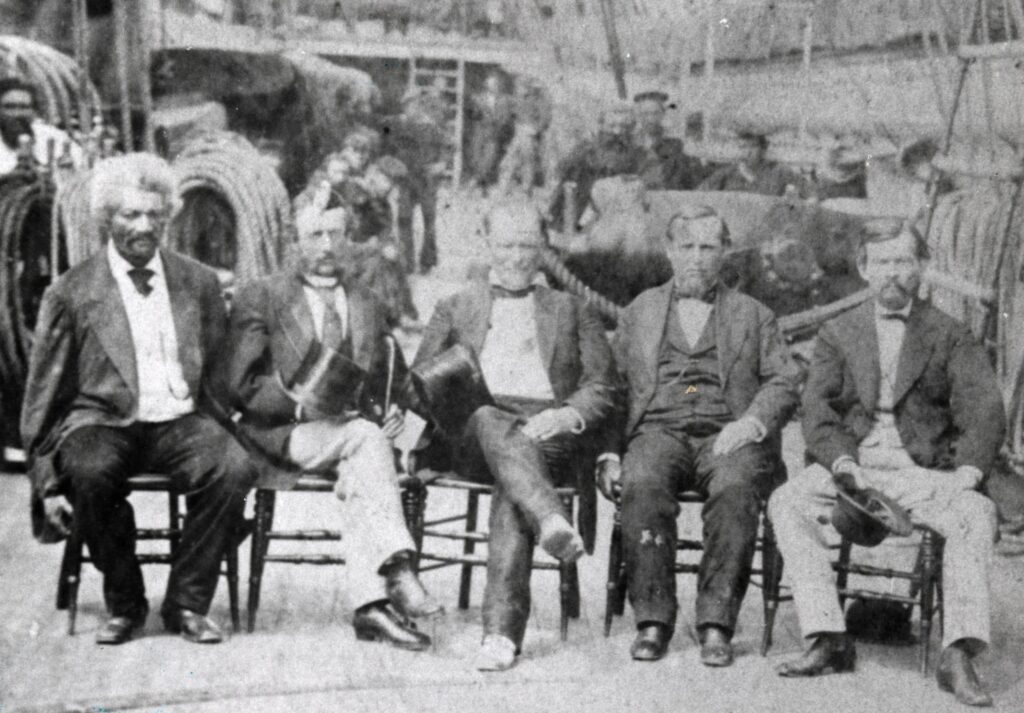Frederick Douglass and American Empire in Haiti
(Missed this when it was originally published.)
Toward the end of his life, Frederick Douglass served briefly as U.S. ambassador to Haiti. The disastrous episode reveals much about the country’s long struggle for Black sovereignty while always under the threat of U.S. empire.
Peter James Hudson

Frederick Douglass and the Haiti Commission on USS
Tennessee in Key West. Image: Florida Keys Public Libraries
Douglass’s personal account exposes the fraught negotiations faced by Black folk who chose to serve the cause of U.S. imperialism.
December 9, 2021
At the age of seventy-one, Frederick Douglass was appointed ambassador to the Republic of Haiti by the administration of U.S. president Benjamin Harrison. Douglass had helped stump for Harrison during the 1888 presidential elections and the position was something of a reward for the elderly abolitionist. However, Douglass’s short time in the post—from the end of 1889 to the summer of 1891—was an absolute debacle. It served to tarnish the latter days of Douglass’s venerable career and is widely seen—by both his contemporaries and by later biographers and critics—as having been calamitous.
At the time, the Harrison administration sought to lay the blame for this failure on Douglass. Yet Douglass’s personal account of those years exposes instead the fraught negotiations faced by Black folk who chose to serve the cause of U.S. imperialism. His account also reveals the unbridled paternalism and bullying contempt that has, historically, shaped and governed U.S. “diplomatic relations” with the hemisphere’s first independent Black nation. In it we can also see a precursor to a century of U.S. electoral and financial meddling in Haiti that has led to the gutting of its economy and the undermining of its sovereignty—and, now, to the ongoing crisis of its democracy. An embittered coda to an eminent life, Douglass’s account reveals as much about U.S.–Haitian relations in our present moment as it does about the past.
_________________
When Harrison ran as the Republican candidate for the 1888 election, Douglass’s support was integral to securing northern Black votes and defeating a Black congressional candidate opposing Harrison’s man in Virginia. When Harrison won, Douglass hoped to receive the sinecure of recorder of deeds as a reward for his service. Instead, Secretary of State James G. Blaine offered him the position of minister resident and consul general to the Republic of Haiti, afterward adding chargé d’affairs of Santo Domingo (the capital of the Dominican Republic) to Douglass’s portfolio.
“My influence, in the opinion of the President,” Douglass wrote in accepting the commission, “would be the most potent we could send thither, for the peace, welfare, and prosperity of that warring and dissatisfied people.” The State Department had other ideas regarding Douglass’s influence, hoping to use it to undermine Haiti’s independence while strengthening the U.S. expansionist project in the Caribbean.
More:
https://www.bostonreview.net/articles/frederick-douglass-and-american-empire-in-haiti/
(I notice the photo is tilted, and at least a couple of the subjects are holding onto their chairs as the ship is apparently rolling beneath them!)
